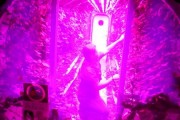 2016-03-23
2016-03-23
Philips Lighting, a Royal Philips company and global leader in lighting, has collaborated with The University of Arizona Controlled Environment Agriculture Center (CEAC) to test energy efficient ways to grow food that will help feed astronauts on missions to the moon, Mars and beyond. A recent study, conducted over a nine week period, found that replacing water-cooled high-pressure sodium (HPS) systems with energy efficient LED lighting from Philips in a prototype lunar greenhouse resulted in an increased amount of high-quality, edible lettuce while dramatically improving operational efficiency and use of resources.
Continue reading →
 2016-03-23
2016-03-23